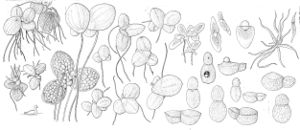Difference between revisions of "Lemna turionifera"
Aquatic Botany 1: 355, fig. 4g–h. 1975.
FNA>Volume Importer |
FNA>Volume Importer |
||
| Line 24: | Line 24: | ||
|elevation=0–3700 m | |elevation=0–3700 m | ||
|distribution=St. Pierre and Miquelon;Alta.;B.C.;Man.;N.B.;Nfld. and Labr.;N.W.T.;N.S.;Ont.;P.E.I.;Que.;Sask.;Yukon;Ala.;Alaska;Ariz.;Calif.;Colo.;Conn.;Idaho;Ill.;Ind.;Iowa;Kans.;Mass.;Mich.;Minn.;Mo.;Mont.;Nebr.;Nev.;N.J.;N.Mex.;N.Y.;N.Dak.;Ohio;Okla.;Oreg.;Pa.;R.I.;S.Dak.;Tex.;Utah;Vt.;Wash.;W.Va.;Wis.;Wyo.;Mexico (Baja California);Eurasia. | |distribution=St. Pierre and Miquelon;Alta.;B.C.;Man.;N.B.;Nfld. and Labr.;N.W.T.;N.S.;Ont.;P.E.I.;Que.;Sask.;Yukon;Ala.;Alaska;Ariz.;Calif.;Colo.;Conn.;Idaho;Ill.;Ind.;Iowa;Kans.;Mass.;Mich.;Minn.;Mo.;Mont.;Nebr.;Nev.;N.J.;N.Mex.;N.Y.;N.Dak.;Ohio;Okla.;Oreg.;Pa.;R.I.;S.Dak.;Tex.;Utah;Vt.;Wash.;W.Va.;Wis.;Wyo.;Mexico (Baja California);Eurasia. | ||
| − | |discussion=<p>I know of no specimens of Lemna turionifera from Maine, New HampshireSt. Pierre and Miquelon, or from New Jersey, but the species is to be expected there..</p> | + | |discussion=<p>I know of no specimens of <i>Lemna turionifera</i> from Maine, New HampshireSt. Pierre and Miquelon, or from New Jersey, but the species is to be expected there..</p> |
|tables= | |tables= | ||
|references= | |references= | ||
| Line 48: | Line 48: | ||
|publication year=1975 | |publication year=1975 | ||
|special status= | |special status= | ||
| − | |source xml=https://jpend@bitbucket.org/aafc-mbb/fna-data-curation.git/src/ | + | |source xml=https://jpend@bitbucket.org/aafc-mbb/fna-data-curation.git/src/8f726806613d60c220dc4493de13607dd3150896/coarse_grained_fna_xml/V22/V22_440.xml |
|genus=Lemna | |genus=Lemna | ||
|species=Lemna turionifera | |species=Lemna turionifera | ||
Revision as of 15:58, 18 September 2019
Roots shorter than 15 cm, tip mostly rounded; sheath not winged. Stipes white, small, often decaying. Fronds floating, 1 or 2–few, coherent in groups, obovate, scarcely gibbous, flat, 1–4 mm, 1–1.5 times as long as wide, margins entire; veins 3, greatest distance between lateral veins near or distal to above middle; papillae distinct on midline of upper surface (apical papilla scarcely larger than others); lower surface often red (more intensely so than on upper), coloring beginning at attachment point of root, upper surface (especially near apex) sometimes with red spots; air spaces to 0.3 mm; turions sometimes present, rootless, olive to brown, 0.8–1.6 mm diam., sinking to bottom. Flowers: ovaries 1-ovulate, utricular scale with narrow opening at apex. Fruits 0.5–0.6 mm, not winged. Seeds with 30–60 indistinct ribs, staying within fruit wall after ripening. 2n = 40, 42 (G), 50, 80.
Phenology: Flowering (occasional) summer.
Habitat: Mesotrophic to –eutrophic, quiet waters, in continental, temperate regions
Elevation: 0–3700 m
Distribution

St. Pierre and Miquelon, Alta., B.C., Man., N.B., Nfld. and Labr., N.W.T., N.S., Ont., P.E.I., Que., Sask., Yukon, Ala., Alaska, Ariz., Calif., Colo., Conn., Idaho, Ill., Ind., Iowa, Kans., Mass., Mich., Minn., Mo., Mont., Nebr., Nev., N.J., N.Mex., N.Y., N.Dak., Ohio, Okla., Oreg., Pa., R.I., S.Dak., Tex., Utah, Vt., Wash., W.Va., Wis., Wyo., Mexico (Baja California), Eurasia.
Discussion
I know of no specimens of Lemna turionifera from Maine, New HampshireSt. Pierre and Miquelon, or from New Jersey, but the species is to be expected there..
Selected References
None.
